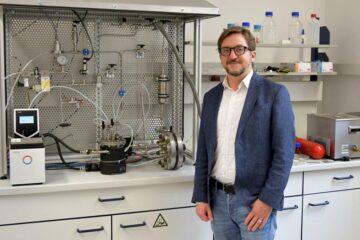Inositolized Phospholipids as Antiproliferative Agents

<strong>Background</strong><br>
Phospholipid analogues with high metabolic stability have been synthesized and proven to be successful as anti-proliferative agents. Due to negative side effects efforts have been made to synthesize phospholipids that are less cytotoxic.<br><br> <strong>Technology</strong><br> We offer a novel class of synthetic phospholipids, a method for preparing the phospholipids and their use for the treatment of proliferating diseases such as psoriasis and cancer. <br><br> The effectiveness of the synthetic ether phospholipid Ino-C2-PAF has been assessed in vitro and in vivo. In vitro studies with cancer cells and keratino-cytes revealed strong anti-proliferative and anti-inflammatory effects. Fur-thermore, in vivo studies in a mouse model of psoriasis (K5.hTGFß) proofed that Ino-C2-PAF has great therapeutic potential without having mutagenic or toxic side-effects. <br><br> Thus, these results position Ino-C2-PAF as an exciting new therapeutic agent for psoriasis.<br><br> <strong>Benefits</strong><br> <ul> <li>strong anti-proliferative and anti-inflammatory effects</li> <li>no mutagenic and no toxic side-effects</li> <li>wide spectrum of application including cancer and psoriasis</li> </ul><br> <strong>IP Rights</strong><br> Patent granted in US, JP, DE, CH, ES, FR, GB, IT (priority 11/2002); <br> Patent pending in CA<br><br> <strong>Patent Owner</strong><br> Charité – Universitätsmedizin Berlin
Weitere Informationen: PDF
ipal GmbH
Tel.: +49 (0)30/2125-4820
Ansprechpartner
Dr. Dirk Dantz
Media Contact
Alle Nachrichten aus der Kategorie: Technologieangebote
Neueste Beiträge

Ideen für die Zukunft
TU Berlin präsentiert sich vom 22. bis 26. April 2024 mit neun Projekten auf der Hannover Messe 2024. Die HANNOVER MESSE gilt als die Weltleitmesse der Industrie. Ihr diesjähriger Schwerpunkt…

Peptide auf interstellarem Eis
Dass einfache Peptide auf kosmischen Staubkörnern entstehen können, wurde vom Forschungsteam um Dr. Serge Krasnokutski vom Astrophysikalischen Labor des Max-Planck-Instituts für Astronomie an der Universität Jena bereits gezeigt. Bisher ging…

Wasserstoff-Produktion in der heimischen Garage
Forschungsteam der Frankfurt UAS entwickelt Prototyp für Privathaushalte: Förderzusage vom Land Hessen für 2. Projektphase. Wasserstoff als Energieträger der Zukunft ist nicht frei verfügbar, sondern muss aufwendig hergestellt werden. Das…

















